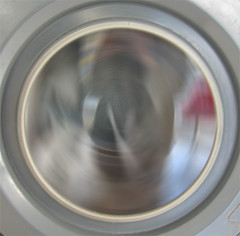
- Image by Sunfox via Flickr
Ever damage or break an appliance in the middle of cleaning it? I know I have. And if you’re expecting company and the repairman can’t get there, you’re stuck. Here are ten tips for cleaning your appliances safely.
- Read the manual. All manuals provide cleaning instructions, so keep yours in a file for easy access. If you can’t find one, check for your manual online. But don’t follow the manual blindly. If it calls for a specific product, you probably have a substitute at home.
- Unplug it. If the outlet is hard to reach, you can turn off the correct circuit breaker in the electric box. Remember to turn your refrigerator or freezer back on afterward.
- Prepare for cleanup. Use gloves and wear old clothes. Spread newspaper underneath to catch spills and crumbs.
- Don’t lose it. Keep a jar handy to store small parts as you remove them. You may want to draw a diagram so you can put them back correctly. Wash small parts in a pillow-case or mesh bag in the washing machine.
- Be gentle (I). Harsh chemicals or rough cleaning materials like scotch-bright can damage a shiny finish. Wipe or spray delicate surfaces with a gentle solution, like all-purpose cleaner or dish detergent, wait a few minutes, then wipe.
- Be gentle (II). It’s no secret that modern appliances use flimsy parts. Use two hands to remove shelves and drawers, and allow plenty of space to work.
- Use chemicals wisely. Follow instructions on labels, wear gloves, and never mix ammonia and bleach. Use as small an amount as necessary and rinse carefully.
- Keep it dry. Use a damp cloth for electronic keypads and the stovetop, which stop working when their insides get wet. If you’re lucky they’ll start working again after they dry out, but it can take a few days. Wet appliances can also trip the circuit breaker and cause a power outage.
- Beware of self-cleaning ovens. Ovens are notorious for breaking during the self-cleaning cycle. If you run the cycle too often, you’ll use up the “glowbar.” But if you wait too long, the mechanism won’t be able to handle all the gunk. Run it after a major cooking session, never before.
- Be gentle on yourself. A clean appliance isn’t worth a bad back. Know when to ask for help with moving appliances or heavy parts.
Have you ever broken an appliance while cleaning it? Please share your experience and advice in the comments.
If you enjoyed this post you my also like:

Beware of self-cleaning ovens
I should have read this post a few weeks ago. It seems the oven has just died during the self-cleaning cycle. The thing is since I needed it for Pesach baking I couldn’t run it after the cooking session. Verdict in about an hour when it has cooled down and can be opened but I am not optimistic; no lights left whatsoever.
My sympathies, I-D. Yes, it’s better to do it a few days before you need it just in case. I am sure you will manage fun. Did you get this oven with your new kitchen?
Yes, less than four years ago. Which means it is still under warranty. I’ll have to start phoning Ikea after the chagim. Why am I so sure it is going to take ages to get it repaired? Fortunately I still have the bill.